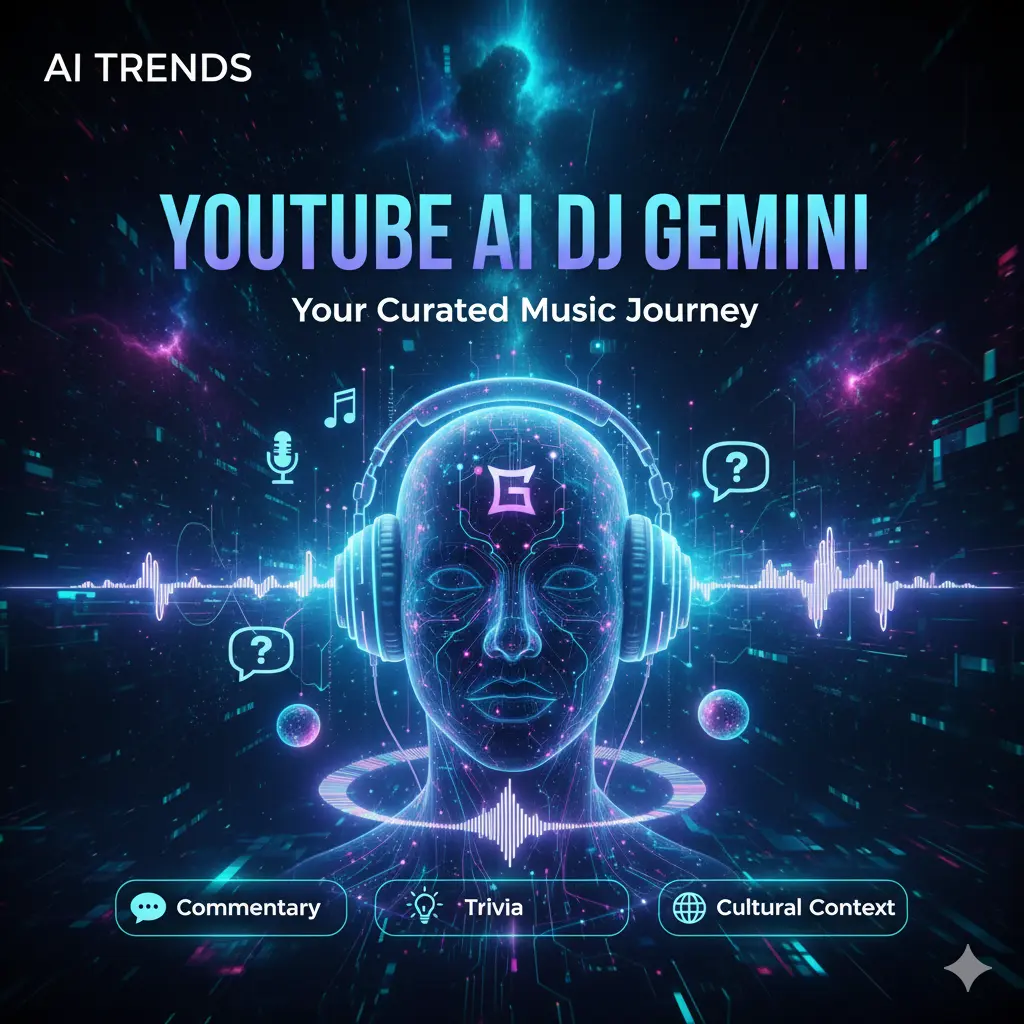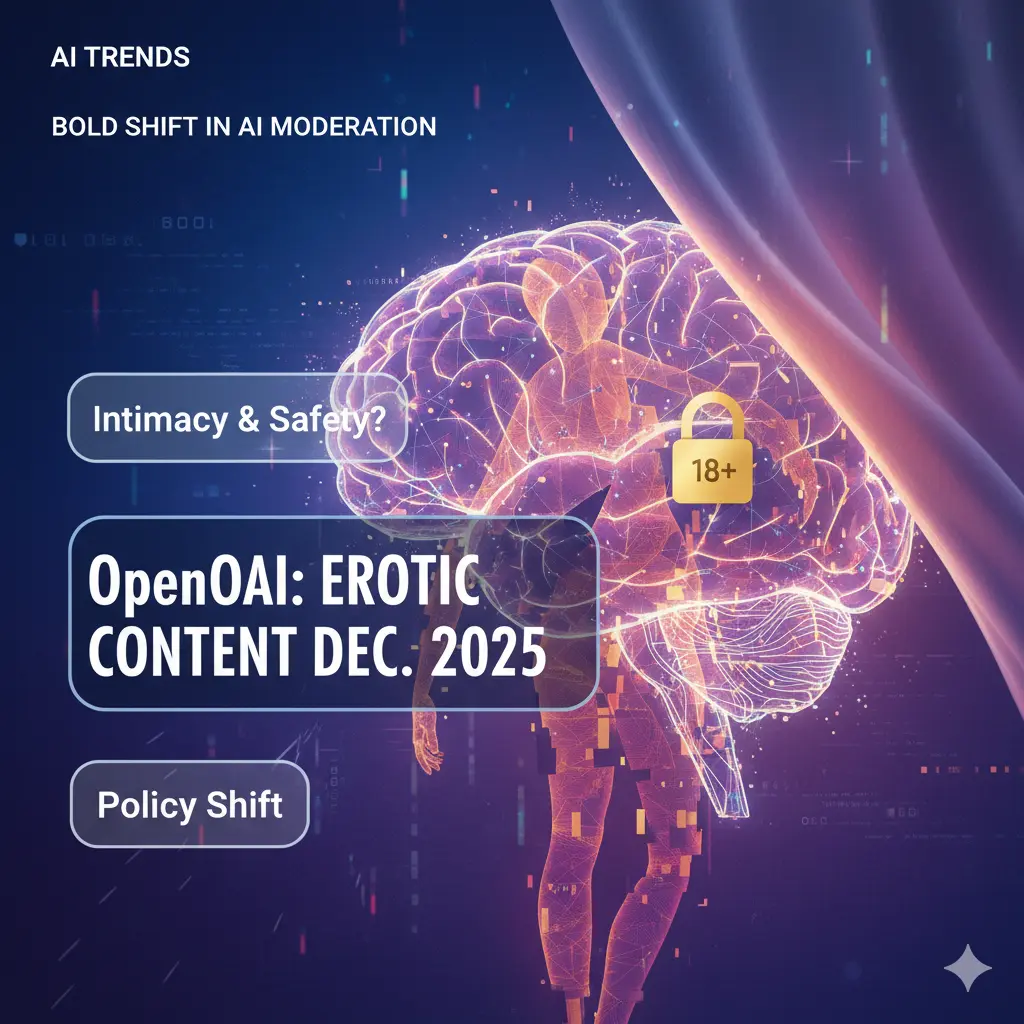With YouTube Labs, Google adds conversational AI hosts between songs—bringing commentary, trivia, and radio flair to your playlists.
By AI Trend Scout | October 17, 2025
Pull Quote: “The new AI-powered music host runs like a radio show … the hosts will chime in periodically between tracks.” Android Gadget Hacks
Read more: YouTube Rolls Out AI Hosts in Music App: The New Gemini-Powered DJ Experience
Introduction
YouTube is joining the AI DJ revolution. Through its experimental YouTube Labs initiative, the company has unveiled a new feature in the YouTube Music app that adds AI-powered hosts between tracks. These digital DJs don’t change what you’re listening to they enhance it, offering artist trivia, cultural context, and fun commentary, all delivered with the polish of a radio show.
At the core is Google’s Gemini AI, now embedded as a music co-pilot. And while the feature is currently limited to select U.S. users, it signals a potential evolution in how streaming services craft audio experiences.
How It Works
Mock Screenshot: YouTube Music “Now Playing” screen with Gemini sparkle icon beside like/dislike buttons. [Visual mockup: Floating sparkle button with label “Gemini AI Host”]
The AI DJ experience is part of YouTube Labs a testbed for experimental features. Here’s what users get:
- Gemini-Powered Hosts: Two friendly AI voices comment periodically between songs in your playlists or radio mixes.
- Smart Commentary: The hosts provide artist facts, music history, genre backstories, and even light banter.
- Context Aware: Commentary adapts to the music’s mood and content.
To activate the feature:
- U.S. users opt into YouTube Labs via youtube.com/new.
- Once enabled, a Gemini sparkle icon appears in the Now Playing screen.
- Tapping it activates the AI hosts, who will begin chiming in occasionally—not after every track.
Sidebar: Feature Controls
- Snooze AI Hosts: You can snooze the feature for 1 hour or 1 day.
- No Full Disable (Yet): There’s no permanent off-switch during this test.
- Limited Rollout: Only a subset of U.S. users currently have access.
What’s Unique: Gemini Meets Music
YouTube’s AI hosts aren’t just playlist generators. They add personality and context to your listening experience, aiming to make music feel more like a shared journey than a passive stream.
Powered by Google’s Gemini model, the AI taps into a rich metadata reservoir—song histories, artist bios, YouTube fan commentary, and even pop culture links. Unlike Spotify’s DJ, which focuses on music transitions, YouTube’s Gemini hosts lean into storytelling and contextual enhancement.
Pull Quote: “It’s less a DJ mixing beats and more a co-host adding flavor to the musical vibe.” TechRadar
Early Reactions & Limitations
Initial feedback has been mixed but mostly positive. Testers appreciate the added depth and radio-like experience, but some find the tone inconsistent.
Mock Screenshot: Gemini hosts speaking: “Did you know this track was inspired by 80s synthpop legends?”
Pros:
- Engaging trivia adds value.
- Voices feel natural and upbeat.
- Breaks the monotony of algorithmic playlists.
Cons:
- Humor sometimes falls flat.
- Commentary may interrupt flow for deep listeners.
- No way to fully disable hosts (yet).
Why It Matters
This experiment highlights the future of AI-assisted listening. Music apps are no longer passive libraries they’re becoming interactive media experiences.
Benefits:
- Richer user engagement: Deeper connection to songs and artists.
- Personalized entertainment: Commentary could soon tailor itself to your tastes.
- Competitive edge: Differentiates YouTube Music in a crowded field.
Sidebar: Spotify vs YouTube AI DJ
Feature Spotify YouTube Voice Prompts Yes Not yet Text Prompts Yes No Commentary Minimal Deep contextual Playlist Mixing Yes No Host Personality Limited Conversational duo
Risks & Open Questions
- Intrusiveness: If hosts overtalk or mismatch tone, they may annoy users.
- Factual reliability: Commentary must be accurate, or trust will erode.
- Control: Users will expect full toggle options soon.
- Privacy: Personalization must be transparent and respectful of user data.
The Road Ahead
Today it’s an experiment. Tomorrow it could be a fully customizable, genre-specific, mood-aware co-DJ with dynamic mixing capabilities. If successful, Gemini AI hosts might evolve to:
- Change tone based on genre (e.g., hype voice for EDM, calm voice for jazz)
- Respond to live prompts like “What else sounds like this?”
- Integrate YouTube video insights (e.g., behind-the-scenes clips)
- Offer multilingual hosting options
Mock Screenshot: Gemini Host settings panel: Voice Style (Chill / Energetic / Minimal), Frequency (Low / Moderate / High)
Conclusion
YouTube’s new AI host feature, powered by Gemini, reimagines music streaming as a more engaging and conversational experience. It won’t replace your favorite playlists or DJs, but it could make them a lot more interesting.
As AI becomes more integral to entertainment, features like these suggest a future where music apps are not just players they’re storytellers, companions, and even friends.


